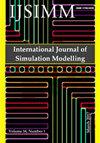使用一体式流程、人机工程学和单元布局改进电机装配
IF 2.4
3区 工程技术
Q2 ENGINEERING, INDUSTRIAL
引用次数: 0
摘要
制造组织不断努力提高绩效,以在竞争激烈的市场中生存。本研究旨在利用离散事件仿真模型来制造电机转子零件,以提高生产线的性能。虽然以前的研究主要集中在技术因素上,但本文解决了物理工效学对生产线性能影响的研究不足。通过将人体运动与其他改进方法相结合,本研究提出了四种策略:一体式流程、消除不必要的人体运动、将其集成以及切换到细胞制造系统(CMS)。结果表明,在一些工作站之间采用单件式流程,生产力和资源利用率分别提高了约21%和9%。然而,由于机器的自动化性质,消除了不必要的运动,导致了微不足道的改进。最后,研究发现,将生产线转换为CMS可显著提高生产率(32%)、最大资源利用率(17%),并减少在制品(40%)。(本文章由计算机程序翻译,如有差异,请以英文原文为准。
Improving Electric Motor Assembly using One Piece Flow, Ergonomics, and Cellular Layout
Manufacturing organizations continuously strive to improve their performance to survive in the competitive market. This study aims to improve the performance of a production line by utilizing a discrete event simulation model for manufacturing the rotor part of an electric motor. While previous studies have focused primarily on technical factors, this paper addresses the shortage of research on the impact of physical ergonomics on production line performance. By integrating human movements into other improvement methods, this study proposes four strategies: one-piece flow, elimination of unnecessary human motions, their integration, and switching to a Cellular Manufacturing System (CMS). The results demonstrate that the adoption of the one-piece flow among some workstations increases productivity and utilization of resources by about 21 % and 9 %, respectively. However, the elimination of the unnecessary motions resulted in insignificant improvement due machine’s automatic nature. Lastly, the study found that converting the production line into a CMS resulted in a significant increase in productivity (32 %), maximum resource utilization (17 %), and a decrease in work in process (40 %). (
求助全文
通过发布文献求助,成功后即可免费获取论文全文。
去求助
来源期刊

International Journal of Simulation Modelling
ENGINEERING, INDUSTRIAL-ENGINEERING, MANUFACTURING
CiteScore
4.80
自引率
27.60%
发文量
45
审稿时长
>12 weeks
期刊介绍:
The International Journal of Simulation Modelling (IJSIMM) provides a global forum for the publication of all forms of simulation modelling research work in academic institutions, in industry or in consultancy.
The editors of the IJSIMM are searching primarily for original, high-quality, truly insightful, theoretical and application-oriented research papers dealing with simulation modelling, mainly within discrete-event simulation field in production engineering or industrial engineering.
 求助内容:
求助内容: 应助结果提醒方式:
应助结果提醒方式:


